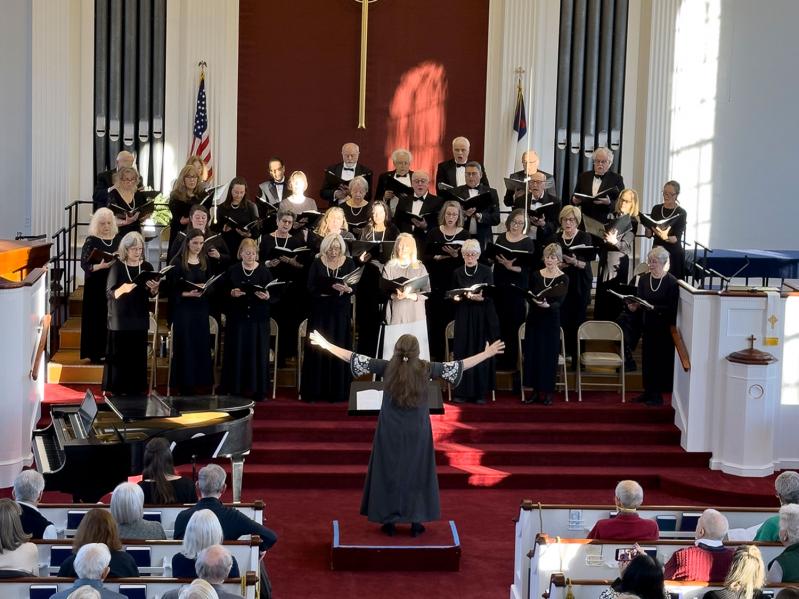The Choral Society of the Hamptons will present a program of contemplative and calming music on Sunday, offering motets by Liszt and the beloved and perennial Fauré “Requiem.” The concert is under the direction of the guest conductor, Kinga Cserjési, and will be performed by a 50-voice choir, soprano and baritone soloists, an eight-member chamber orchestra, and organ.
This will be Ms. Cserjési’s second appearance with the chorus. She has been teaching singing in Budapest and New York City since 1999, and among her many credits, she is a founding member of the ensembles Bartok’s Roses and Les Vagabondes. In 2013 she co-founded La Compagnia Amarilli, a vocal duo, with Deborah Carmichael, which has performed a number of times in East Hampton and Amagansett.
“I really enjoy working with the Choral Society. I’m so glad they invited me back,” Ms. Cserjési said last week. “The first experience was amazing, and this one as well.”
To begin the program, Ms. Cserjési has chosen two motets by Franz Liszt “to warm up our souls to the ‘Requiem.’ “ They are “Pater Noster” (“Our Father”), from the large oratorio “Christus,” and “Ave Maria.”
She said she has recently come to appreciate Liszt more. “I think we misunderstood Liszt, because we know him as a virtuoso. He was the best pianist in the world in the 19th century and he became a real celebrity, like a rock star nowadays. . . . But he was a very spiritual person. It was always present in his life . . . he took religious music very seriously.” The “Pater Noster” was composed around 1862 to 1866, a period of several tragedies in Liszt’s life, when he was living in a monastery and was ordained as an abbot.
As a bridge between the motets and the “Requiem,” Peter Ludlow, the organist for the event, will play an organ transcription of a choral motet by the Renaissance composer Orlando di Lasso, “Regina Coeli Laetare,” as transcribed by Liszt.
The main work is Gabriel Fauré’s masterpiece “Requiem,” which has long been a favorite of singers and audiences alike. A typical setting of the requiem, which is a Mass for the repose of the souls of the departed, may vividly depict fire and brimstone. But Fauré’s is more optimistic, gentle, and reassuring.
In fact, the “Dies Irae” (“Day of Wrath”) that is part of the standard requiem text, filled with fury and judgement, was omitted by Fauré, and replaced with “Pie Jesu,” a most lyrical and mystical soprano solo. To reflect this overall mood, the concert has been dubbed “Lux Perpetua Luceat Eis,” from the Latin phrase in the requiem meaning “May everlasting light shine on them.”
Maria Fumai Dietrich, the executive director of the Choral Society, said in a release, “Audiences can expect to feel transported while listening to the 70-minute program. Music does that . . . transports us, heals us, brings us together.”
The instrumental score of Fauré’s “Requiem” has an especially rich coloring of the mid-range and lower strings and the horns. The chamber orchestra consists of a violin, violas, cello, double bass, French horns, and organ, under the concertmaster, Song-A Cho.
The baritone solos in the “Requiem” will be sung by Stan Lacy. He has recently appeared with the Bronx Opera, the Utopia Opera of Manhattan, the State Repertory Opera of New Jersey, the Raylynmor Opera of New Hampshire, and the Metro Chamber Orchestra of New York.
The soprano soloist for the event is Lily Arbisser. In recent seasons she has been a vocal fellow of the Steans Institute in Chicago, won first prize in the National Federation of Music Clubs’ Biennial Young Artist Competition, and debuted at Weill Recital Hall at Carnegie Hall.
Ms. Arbisser studied at the Libero Canto School of Singing in Manhattan, where Ms. Cserjési is the associate artistic director. Ms. Cserjési explained that Libero Canto is not so much a way of singing as it is an alternative method of teaching singing. It was first developed by Lajos Szamosi in Budapest around the 1940s, in the context of western classical repertoire, with the Italian singing tradition as its ideal.
“I have a unique way of approaching a rehearsal and music making, and I’m very grateful that the Choral Society members are able to accept all these weird things, and go with the flow,” Ms. Czerjesi said with a chuckle. The members of the Choral Society come from as far as Montauk and Riverhead, and engage in an intensive 10-week rehearsal period to present concerts three times a year; some have sung with the group for decades, and for a few this will be their first concert.
The society’s next offering will be on June 29 — and, for a change of pace, it will include the premiere of a newly commissioned arrangement of some Beatles tunes.
The 5:30 p.m. concert this weekend will be held at the Presbyterian Church of East Hampton, with tickets at $35, or $75 for preferred seating, and $10 for students, available at the society’s website or 631-204-9402.




